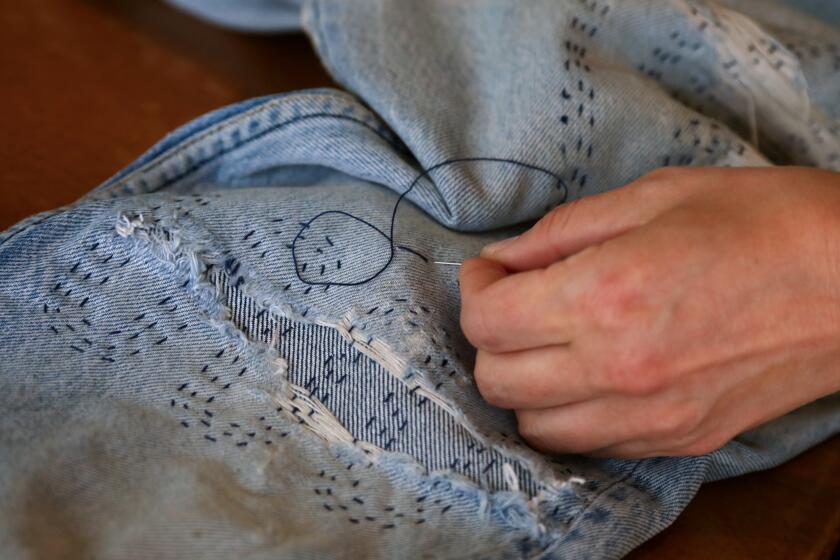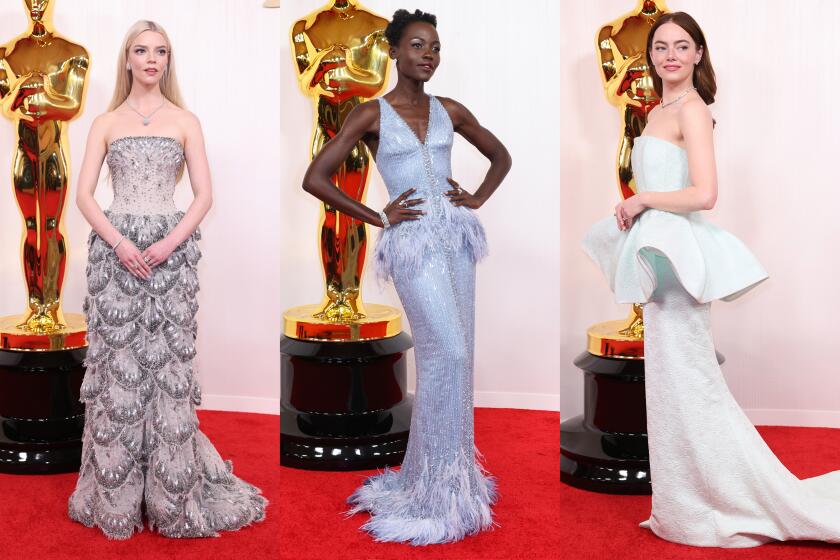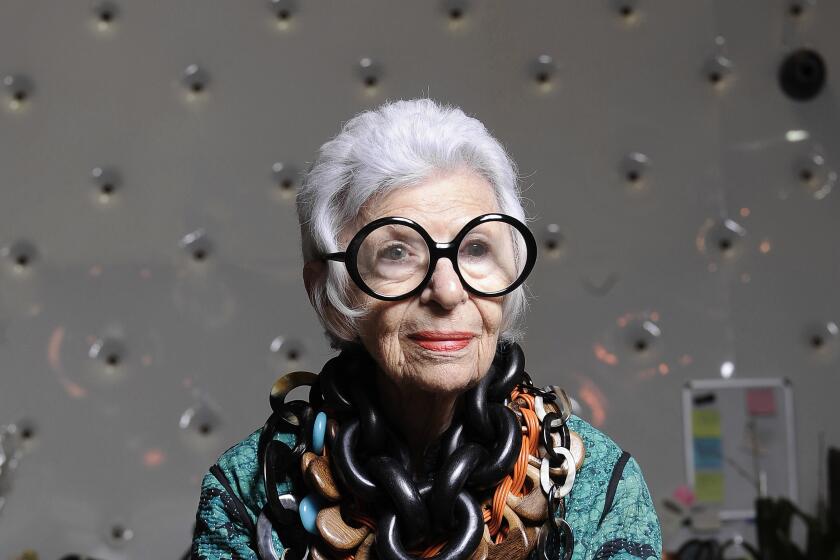Trendy brand keeps it local
Inside a glistening building in an otherwise gritty industrial zone near downtown Los Angeles, young men with trendy hair and tattooed arms sit in front of oversize computer screens and click to the low thump of a hip-hop tune.
The place could pass for a video-gamer boot camp were it not for the piles of pricey jeans and T-shirts in every corner of the room. These are clothing designers for Monarchy Collection, which is bucking an outsourcing movement that has decimated much of Los Angeles’ garment manufacturing industry.
“Everything is made within a two-mile radius of this building” for quick response to fleeting trends, said Monarchy co-owner Eric Kim, 35. Chimed in business partner Henry Kim, 37 (no relation), “This is our way of remaining competitive.”
The 2-year-old company makes highly stylized casual clothing for the young hipster crowd, which is constantly on the prowl for fresh and unique looks. Monarchy feeds those mercurial appetites using T-shirts with elaborate graphics and stitching that retail for as much as $75 apiece at boutiques and department stores, including Nordstrom. Its clothing line -- including hoodies, jackets and $200 jeans -- will bring the company an estimated $25 million in revenue this year.
At a time when more and more clothing companies are seeking cheaper manufacturing abroad, dozens of fledgling labels like Monarchy aren’t. This new collection of manufacturer is capitalizing on Los Angeles’ growing status as a fashion hub and helping stem some of the job losses to China, Indonesia, Vietnam and other countries -- and redefining an industry that has long been a staple of the local economy.
“Outsourcing doesn’t work with this group because it is about creativity,” said Lonnie Kane, president of the California Fashion Assn., a trade group. “They create something and they need to get it to the market fast, and they better be thinking what’s next.”
Making clothes in China is cheaper, but it also takes anywhere from three weeks to three months for products to reach stores in the U.S.
“A lot can change in that time,” said Jim Shaffer, co-owner of Blue Tattoo, another Los Angeles-based maker of high-end casual wear. “Producing locally gives you a better response time.”
Response time matters less for mass-produced clothing, and that’s why most of the companies that supply apparel to large retailers such as Macy’s and Kmart have moved their production abroad where labor is cheaper.
“What you find is that design and marketing are done over here, but a lot of work, the tonnage, is done offshore,” said Jack Kyser, chief economist with the Los Angeles County Economic Development Corp.
Garment makers and wholesalers in Los Angeles County employed more than 100,000 workers five years ago. The numbers have dwindled steadily to about 77,000 now, according to the California Employment Development Department.
Despite the losses, the fashion industry remains one of the largest manufacturing sectors in Los Angeles along with makers of computer and electronic products. Kyser and others believe that companies such as Monarchy and Blue Tattoo are helping slow the outflow of jobs.
And they are doing it in large part because of Los Angeles’ increasing status as a high-fashion venue. The home of Hollywood has always been a style setter, but it often took its fashion cues from New York and Paris while its own garment industry was better known for cheap manufacturing.
In recent years, designer denim has put Los Angeles on the world’s fashion map. Coveted brands such as True Religion, with price tags way into the three figures, were born here and spawned a slew of other clothing lines.
“It is very un-couture,” Blue Tattoo’s Shaffer. “It is the California lifestyle.”
American Apparel, known for its racy ads and its Los Angeles roots, has capitalized on L.A.’s coolness as well, but its monochromatic T-shirts, sweat shirts and underwear are produced for the masses.
Monarchy is for “the person who wants something that is truly unique. It is not just a T-shirt . . . it is a unique T-shirt,” said Eric Kim, dressed in an irreverent pairing of flip-flops with gray slacks and a crisp blue dress shirt.
Kim, a graduate of L.A.’s Fashion Institute of Design and Merchandising, and his crew of a dozen designers create about 300 pairs of jeans and other clothing items a year for men and women. About 120 make it to production, sewn by several local contractors. Only a few thousand of each design are manufactured, compared with tens of thousands or hundreds of thousands for mass-produced labels.
The focus on variety and quality, as opposed to quantity and cost, rules out offshore production, Kim said. “Our stuff is extremely labor intensive; you just can’t manage it overseas,” he said.
The formula has produced rapid growth for Monarchy, which sold $1 million in clothing its first year. The company employs 38 people, including Eric’s wife, Vivian Lee, 29, who is Monarchy’s director of operations.
Although both Kims have worked in the local garment district their entire professional lives, they met through their love of fast cars -- at a gathering of Porsche enthusiasts.
Eric, a native of Los Angeles, oversaw design and production for several other companies. Henry’s family immigrated to the U.S. from South Korea when he was a teenager, and he joined the family’s garment business, K. Kandle, right out of college.
Not everyone is convinced that companies like Monarchy will keep Southern California garment manufacturing out of the rag heap.”I wish it were a lifesaver” for local manufacturing, “but I am not yet a believer,” said Joe Rodriguez, executive director of the Garment Contractors Assn. of Southern California. “At this point, I think China hasn’t bothered with this new trend because the volume is small. But if they decide to play in this field, they could take it overnight.”
Eric Kim said China wasn’t much of a threat to his operation.
“We are constantly creating and innovating so that we can’t be easily mimicked,” he said, pointing to the process of making “whiskers,” faded creases on the upper thighs. “You need to engage with your eyes, make it look natural. If you send this stuff to China it would look like a robot did it.”
--
(BEGIN TEXT OF INFOBOX)
Monarchy Collection
Business: Clothing manufacturer
Owners: Eric Kim, Henry Kim
Projected 2007 sales: $25 million
Employees: 38
Company motto: “It has to be done yesterday.”



